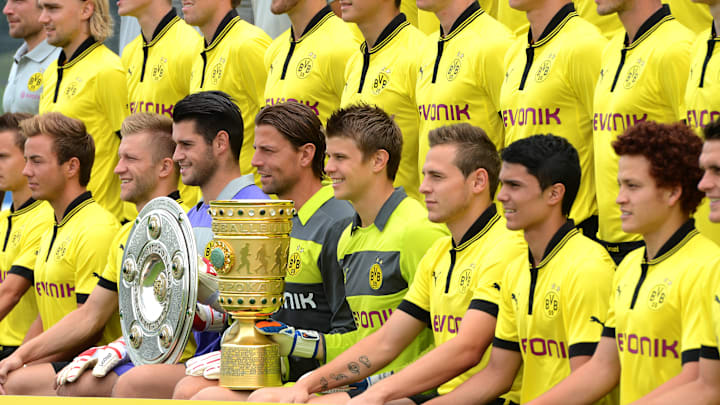In the 2011/12 season, Dortmund didn’t just defend their crown; they made history. Klopp’s relentless high-energy football propelled BVB to the Bundesliga title and a loud DFB-Pokal triumph, securing the club’s first-ever domestic double. It was more than the silverware; it was the style: the fearless pressing, youthful enthusiasm, and the unity between the team and fans that defined the season. A decade on, that campaign still stands as the benchmark of what Borussia Dortmund aspire to be.
Setting the Stage
The 2010/11 title was Dortmund’s first under Klopp. They finished the season with 75 points, a then-new club record, while setting new marks for most wins with 23, and the fastest team to reach 40 points, which was achieved in just 17 games. Crucially, they ended Bayern’s run of three straight titles, signalling an actual changing of the guard.
Yet many still doubted whether BVB could sustain it. Nuri Sahin, their midfield leader, departed for Real Madrid in the summer, and while Ilkay Gundogan was brought in from Nurnberg, expectations were muted. Most saw Dortmund as challengers for the top four, not favourites to retain their crown.
What Klopp had, however, was a clear identity. His gegenpressing system, which consisted of immediate pressure after losing possession, quick transitions, and collective intensity, was both exhausting for opponents and thrilling for fans. Backed by the famous Yellow Wall, each home game becomes a cauldron of noise and belief. Dortmund were no longer just a promising project; they were a force capable of reshaping German football.
Key Figures of the Team
At the heart of Dortmund’s success was a 23-year-old Robert Lewandowski. With 22 league goals and 30 in all competitions, his sharp finishing and movement made him the focal point of Klopp’s attack. Alongside him, Shinji Kagawa was the creative spark, scoring 13 league goals and forming a devastating partnership with the Pole.

Mario Gotze, despite injuries, embodied the fearlessness of the squad with flashes of brilliance that defined Dortmund’s youthful edge. In midfield, Gundogan grew into Sahin’s role, dictating tempo with composure far beyond his years. On the flanks, Jakub Blaszczykowski and Kevin Grobkreutz epitomised Klopp’s philosophy with tireless pressing and endless running.
Defensively, Mats Hummels and Neven Subotic formed a commanding partnership, blending elegance from Hummels with Subotic’s grit. Full-backs Lukasz Piszczek and Marcel Schmelzer provided balance with tireless overlapping runs, while Roman Weidenfeller offered reliability and leadership in goal.
And on the touchline, the catalyst, Jurgen Klopp. His charisma, tactical acumen, and ability to inspire confidence transformed a talented but undervalued squad into history-makers.
The Bundesliga Campaign
Dortmund’s title defence began slowly, with just two wins in their first six matches. But once the squad clicked, they were unstoppable. A 28-match unbeaten run, one of the longest in Bundesliga history, propelled them to the top of the table.
They finished with 81 points, setting a new league record at the time, having won 25 games, drawn six, and lost only three. Signal Iduna Park became a fortress, with Dortmund undefeated at home all season. They scored 80 goals, second-best in the league, while conceding just 25, the league’s tightest defence.
Most importantly, they dominated Bayern in head-to-head matches. In November 2011, Götze’s goal secured a 1-0 away win in Munich. In April 2012, Lewandowski’s strike sealed another 1-0 victory at Signal Iduna Park, a result that all but wrapped up the title.
The crowning moment came on April 21st, 2012, with a 2-0 win over Borussia Monchengladbach, confirming Dortmund as champions once again.
The DFB-Pokal Final
On May 12, 2012, Dortmund faced Bayern Munich in the DFB-Pokal final at Berlin’s Olympiastadion, with a chance to secure a historic double. Klopp’s men delivered a statement performance.
Shinji Kagawa opened the scoring inside three minutes, before Arjen Robben equalised from the spot. Mats Hummels restored the lead with a penalty, and Lewandowski struck before half-time to make it 3-1. The Pole added two more in the second half, completing a stunning hat-trick in a 5-2 demolition.
It was Dortmund’s first-ever domestic double, and their fifth straight victory over Bayern under Klopp. Lewandowski became the first player to score a hat-trick in a Pokal final, while the emphatic win underscored Dortmund’s dominance over their rivals. For Bayern, it was another bitter defeat ahead of their Champions League heartbreak on home soil a week later.

The Legacy
The 2011/2012 season was more than a triumph; it was a transformation. Dortmund didn’t just collect trophies; they redefined German football’s balance of power, if only for a fleeting moment.
It was the first domestic double in the club’s history, an achievement that even the 1997 Champions League winners hadn’t managed. Klopp’s gegenpressing blueprint became a model for modern football, later inspiring managers across Europe.
Individually, the players went on to shape the footballing landscape. Lewandowski, Götze, and Hummels all moved to Bayern, while Kagawa joined Manchester United. Gundogan’s evolution eventually made him a treble-winning captain at Manchester City.
For Dortmund fans, this side represented more than career trajectories. It captured the essence of the club: youthful, fearless, united, and defiant in the face of financial giants—every title challenge since has been measured against the standard set in 2012.
In hindsight, the double was the pinnacle of Klopp’s Dortmund reign. The 2013 Champions League final proved they could compete on the grandest stage, but the 2011/12 was lightning in a bottle, the perfect storm of tactics, talent, and timing.
